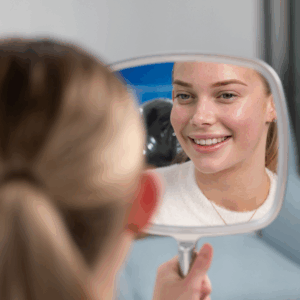How do I Care for a Dental Implant?
A lot of time and financial investment goes into getting teeth implants, so it is important to keep them protected for lifelong. Implants are surgically inserted and require a certain number of visits to the dentist. Once the procedure is complete, maintenance of implants is of critical importance.
Dental implant maintenance
You need to visit your dentist or dental practitioner for routine check-ups and dental implant cleaning. Together with the dentist and his team, you need to decide on the frequency of the visits. Typically, the check-ups take place at regular intervals of 3 to 6 months. These visits involve the examination of your teeth, gums and implants followed by a professional teeth implant cleaning. The cleaning is helpful especially, because those areas of your mouth are touched upon which are otherwise difficult to clean at home. The professional clean-up of dental implants is slightly more complicated as compared to cleaning of teeth. It may take a longer time and requires specific dental instruments. Regular x-rays also need to be undertaken for monitoring of healthy bone.
Routine dental check-ups are also critical because peri-implantitis and mucositis may develop in the absence of any noticeable symptoms.
Oral hygiene
Maintenance of good oral hygiene also plays an important role in implant care. A certain amount of effort is required in removing plaque bacteria each day. This essentially means that apart from routine dental visits; proper brushing, flossing and cleaning of spaces between teeth using an interdental brush are also required.
Clinical research reveals that antibacterial toothpastes have a huge impact on the success of dental implants. Antibacterial toothpaste helps in maximum reduction of plaque bacteria as it continues to destroy plaque bacteria post brushing.
Immediately after the teeth implant is surgically placed, a certain amount of sensitivity can be experienced around the wound. So, it might be difficult to brush in that part for a while. However, after one or two days of the implant surgery, you may brush with a special toothbrush that has very soft bristles for cleaning the area. When the placement of the dental prosthesis is complete, you can easily brush in the implant area.
Practicing good oral hygiene also involves good eating habits and quitting habits such as smoking. Improper oral hygiene may result in implant loss. In the absence of adequate oral hygiene, bacteria have the tendency to multiply on the implant surface causing damage.
Any surgical or invasive procedure carries risks. Before proceeding, you should seek a second opinion from an appropriately qualified health practitioner.




